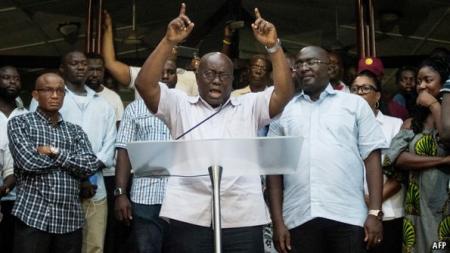JUST before 9pm on Friday night celebrations erupted in Accra. Ghana’s electoral commission had declared the opposition leader, Nana Akufo-Addo, the winner of the presidential election and his supporters were in the mood to party, dancing in the streets, honking car horns and setting off fireworks late into the night. It was a resounding victory for Mr Akufo-Addo (pictured), who took 53.85% of the vote, on his third run for the presidency, to incumbent John Mahama’s 44.4%.
It was also another win for Ghana’s vibrant democracy. The West African country, home to 27.4m people, has now held seven peaceful presidential elections since the return of multiparty democracy in 1992. This was the third turnover of power from ruling party to opposition. It was also notable for being the first time an incumbent president had been defeated in Ghana.
Voters punished Mr Mahama and his National Democratic Congress (NDC) for Ghana’s economic woes. Growth shot up to 14% in 2011 after the country started pumping oil, but has since slumped to less than 4%. Although falling oil prices were not the NDC’s fault, it took the blame for spending the expected windfall before it had arrived so that it had to turn to the IMF for a bail-out last year.
Still, the vote also showed some areas for improvement in Ghana’s democracy. Many people still vote along ethnic lines: the central Ashanti region reliably plumps for the Mr Akufo-Addo’s New Patriotic Party (NPP) and the Volta in the east for the NDC (although this time many NDC supporters stayed at home). Voters are handed rolls of cedi notes during campaigns; many of them expect politicians to bring development to their areas rather than the whole country. “NPP supporters were celebrating like that in part because they genuinely believe that this will make a difference to themselves,” says Nic Cheeseman of the University of Oxford, who attended the raucous opposition celebrations in Accra.
But democratic norms were also firmly in evidence. Ghanaians waited patiently while the electoral commission took a painstaking 52 hours to count and verify their votes. Mr Mahama’s concession was swift.
It was also in stark contrast to events in nearby Gambia. Supporters of African democracy cheered when its strongman, Yahya Jammeh, conceded defeat in the country’s presidential election just days before the vote in Ghana. Yet even as Ghanaians partied, Mr Jammeh went back on Gambian state television to say he didn’t accept the result after all.
To read the full piece from The Economist, click here.

